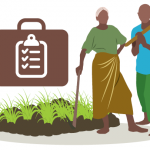OCT 31, 2017 - 12:15 PM TO 01:45 PM EDT The upcoming COP23 will focus attention on how to achieve the goals set by the Paris Agreement while also pursuing the Sustainable Development Goals. Meeting these goals will require long-term planning capacity at the country level. New research from IFPRI and partners provides insight into tools and approaches—including […]
Conceptual Framework: Gender, Climate Change, and Nutrition Integration Initiative
As both the current and future impacts of climate change are coming into focus, policymakers, communities, households, and individuals around the world are taking steps to prepare for and respond to these challenges proactively. While greater awareness now exists of the types of challenges climate change engenders, many decisionmakers still lack context-specific information on climate […]
Policy Note on Climate Change, Gender and Nutrition Linkages – Research Priorities for Cambodia
Agriculture is extremely important to Cambodia, representing at least one-third of the nation’s gross domestic product and providing employment to around 60 percent of the labor force. It is perhaps the most sensitive sector to changes in climate, with higher temperatures stressing plants, livestock, and workers, and rainfall variation through droughts and floods leading to crop losses and food insecurity. While it is important to consider the impact of climate change on agricultural production, it is also important to consider other cross-cutting issues to achieve the goals of Feed the Future and the Global Food Security Strategy—especially gender and nutrition. This policy note summarizes assessments of these linkages in Cambodia under the Gender, Climate Change, and Nutrition Integration Initiative (GCAN).
FtF Datathon: SAVE THE DATE!
To increase public awareness and the use of Open Agriculture and Nutrition Datasets in agricultural research and development, IFPRI's G-CAN Project Team is working to make household-level data more approachable and interoperable. The team will organize the first Feed the Future DATATHON event in Washington, DC to showcase findings from the harmonized data in Bangladesh and also invite avid data geeks to generate […]
Policy Note on Climate Change, Gender and Nutrition Linkages – Research Priorities for Bangladesh
Climate change, coupled with high levels of poverty and population density, is a substantial threat to sustainable development in Bangladesh. Climate-related threats, such as flooding, inundation, salt-water intrusion, and changes in temperatures are increasing with climate change. Achieving the goals of Feed the Future and the Global Food Security Strategy requires careful consideration of the impact of relevant climate science on agricultural production, while at the same time considering other cross-cutting issues that influence agricultural growth, poverty alleviation, and resilience—especially gender and nutrition. This policy note summarizes assessments of these linkages in Bangladesh under GCAN.





